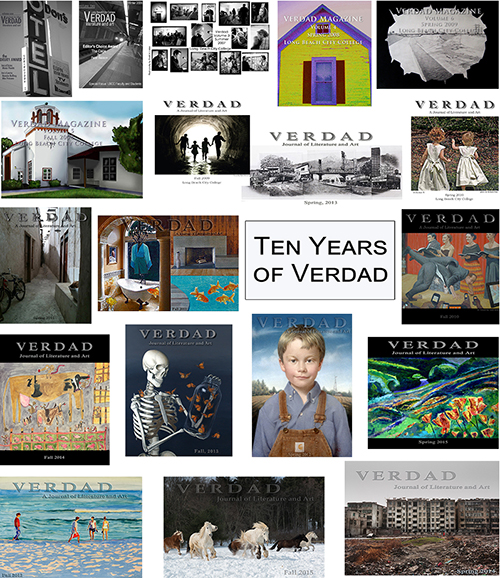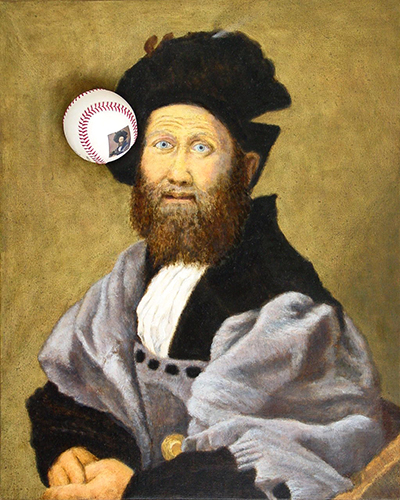Verdad Magazine Volume 19
Spring 2016, Volume 20
After Hours

Looking back, it’s been a good ten years as my compatriots and I learned the ropes of online publishing, interfaced with writers and artists from all over the world, produced as high a quality publication as we could; and gradually gained readership. Verdad sees around 300 visitors per month during quiet times, but activity swells to over a hundred visitors a day during the week a new issue is released.
Our editorial staff members have spent countless hours reading and in some cases, soliciting submissions, suggesting changes, and writing reviews and commentary, while at the same time leading busy professional and personal lives.
I, as well, in my role as webmistress, have taken time out from household chores, babysitting grand kids, managing other websites, and dealing with family emergencies and illness, to build every issue of Verdad since volume seven.
With so many obligations filling our days and free time so limited, it is easy to avoid doing anything extra. But Verdad staff members not only work on the magazine, they also work at perfecting their craft and have become creative talents in their own right.
Poetry editor Bill Neumire has a growing family and teaches writing, which as we know requires long hours of grading written assignments and tests; yet in his few spare moments, when he is not reading submissions and writing commentary for Verdad, he writes poetry and authored a first book, Estrus, published in 2013, and is now working on another. One of his lovely poems:
Sleep Studies: Emelia
you have known
no words
in the biblical sense
they have not lain with you
in your window-washed crib
with the letters of your new name
like teeth & shadow abovepetals of the fan
shadow-star the ceiling
all light thrown up
all up disfigured
all down
a pool of footlightsóyou sleep
the dog sleeps
the books all sleep
the way even
things broken
from one great star
sleep, the way sleep
is a needed sort of memory
that one day
stitches itself whole

Art editor Jack Miller, a retired medical doctor, is also an amateur baritone, chocolatier and chef, story writer, art teacher and accomplished artist. He’s always busy, yet finds time to review art submissions and search out new and exciting artists for Verdad. Jack was a Verdad contributor before he offered to be our art editor, and his paintings are featured on the cover and in the art section of volume nine. To the right is one of his paintings, "Count Baldassare Castiglio with Baseball," the count's face displaying "...a bit of anxiety to bring him into the 21st century."
Our inimitable editor-in-chief, Bonnie Bolling, lives part time in California and part time in the Middle East; and despite unreliable internet, nearby anti-government protests and anti-Western violence throughout the region, she oversees every aspect of Verdad and has also authored two prize-winning collections of poetry. Here is an excerpt from a poem, originally published in Verdad volume three, that will appear in her new book, The Red Hijab, forthcoming from BkMk press.
Noon (Al Dhuhr)
after Wislawa Szymborska Lo! God has bought from the believers
their lives and their wealth
because the Garden will be theirs…
—Qur’an 9:111
He’ll put on the vest at noon.
But first, he’ll walk his sister to school
and buy bread for the house at the market.
She waits on a stool in the kitchen.
She’s young—no breasts to speak of yet.
She salts her egg, drinks a cup of milk.It’s only nine fifteen. Still plenty of time.
They walk side by side in the cool breath of morning,
a used book in her hand, ballet slippers—
and the unused vest in his.
The vest’s not heavy, maybe the weight
of a couple of stones or a soccer ball.
The school’s not far—it faces the sea,
a school for girls, with religious women who teach.
His sister kisses his cheek, turns away, goes inside.
Her eyes are blue.
Editor-at-large Frank X. Gaspar leads an active life. He's teaching, most recently as a Ferrol A. Sams Distinguished Writer in Residence at Mercer University in Georgia. He does readings and book signings; as I write, he is in Lisbon for the launch of the Portuguese version of his novel Stealing Fatima and also reading at the Disquiet International Writers Conference and other locations around the city. He still writes both poetry and fiction; and lucky for us, is always on the lookout for new talent to be published in Verdad. Here is his poem, "The Olive Trees" from Verdad volume three and his book, Night of a Thousand Blossoms.
The Olive Trees
In the campus courtyard, in the center of the oldest building
of all the old Spanish buildings, among the white
stuccoed walls, among the ochre tiled roofs, the olive trees
are preparing to leave this world. They are dropping
the dark boles of their olives. They are lightening their burden
as if they might straighten their scarred backs. And the olives
are everywhere under the feet of the young girls and
the young boys and under the shoes of the old men
who are stooped with the weight of their books: olives
like black stars or black fish, staining the brick, drawing
the gnats and the resolute sparrows. The olives are bitter.
You cannot eat them. Here in the sun, on the weathered
bench, I cannot think how Claudius Caesar could have survived
alone on the secret olives he plucked from his trees, when he knew
his wife had poisoned his meals for weeks on end. Yet he outlasted
her resolve. That is the story. But these olives are bitter and
you cannot eat them. And where can they think they are
going, these bent, decrepit trees? See how they cast away
their eyes and ears. And the young, crushing them under
their soft, light feet, and the old, crushing them under
their heavy heels. These trees! See how they think they
have had enough of the earth? See how their shadows
are merely lace, how they leave the morning sun unperturbed?
See how they ready themselves over and over for a new life?
And I, the webmistress—in the midst of my daily routine of cooking, cleaning and computer work—write and validate html, check for browser compatibility, ferret out broken links, and endeavor to make every web page attractive and easy to read (with the assistance of Adobe Dreamweaver, of course). Now I have a new project—that of producing a print edition of Verdad. To help prepare, I self-published my own little book of poems, ones that I'd written during my many years of creative writing classes and which I'd recently revised and added to. The following is an excerpt from a poem about where poems come from:
....Out of the bonfire of words, their poems rise.
They grow from my keyboard and both hands,
from my words made into lines, the lines gathered
in stanzas; they grow out of formal verse and
free verse, out of the rhythm the syllables make;
and the sounds of the words, recurring and diverging,
rhyming and near-rhyming; and the meanings,
literal and figurative, and the vivid imagery evoked;
they feed on memories, on perceptions, on theater of life;
they feed on search for meaning, on engine of emotion,
on flights of imagination, and writing and rewriting;
their poems rise from the heart out of hiding,
from body and breath—the words singing;
and from everything hidden, smoldering inside,
they feed their poems and they rise. They soar free.
from "They Feed Their Poems" (after Philip Levine)
And now we plunge ahead into the future, taking Verdad with us. Let us hope we have many more years of publishing work—poetry, prose and visual art—that is not only beautiful, multi-faceted and touches something inside each of us, but also challenges routine ways of thinking, and inspires us to make new connections and to respond with our own creative contributions. In this way the great river of literature and art slowly changes and evolves with each new addition and comes to reflect the commonalities, differences, and challenges we all face living out our mortal lives on this small planet.
— Rochelle Cocco
